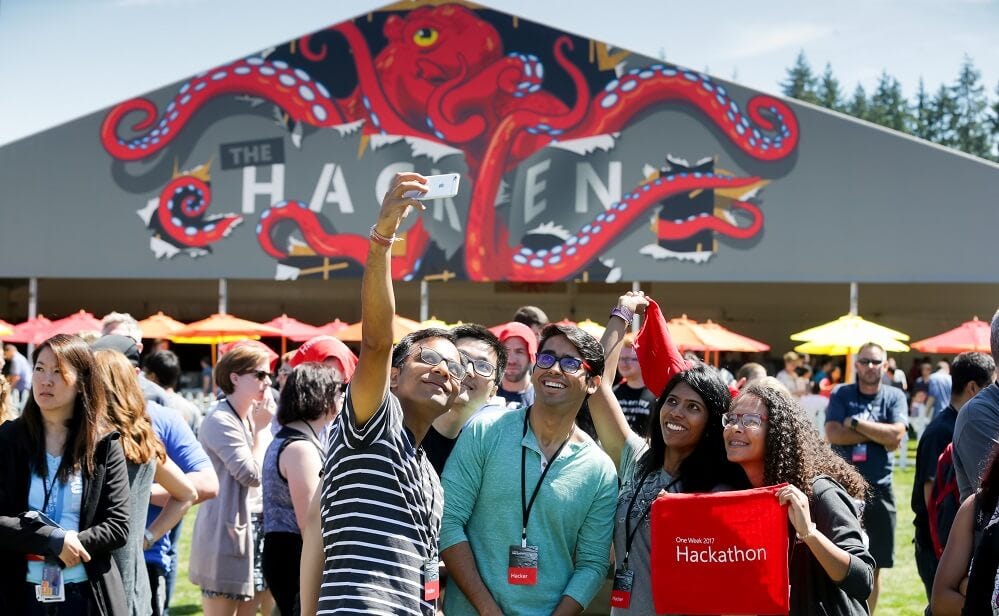Seven hackathon lessons learned from my battle with lymphoma

This story was originally written and posted in August 2017 on the Microsoft Garage blog here.
Last week, I received some of the best news of my life. And the news came at a pretty exciting time. I received the phone call half an hour before the closing ceremony of Microsoft’s 2017 Hackathon, an event that my team puts on. For the Microsoft Garage, a team helping change the way the company works 52 weeks of the year, this is our Super Bowl. Over 18,000 hackers in over 75 countries came together to turn their dreams into reality. At the last minute, I learned that my dream of the past five months had come true.
Five months earlier, my doctor found a large mango-sized mass in my chest. Biopsy revealed that it was diffuse large b-cell lymphoma (DLBCL), this is fortunately very treatable, with 18 weeks of extremely aggressively chemotherapy. The Hackathon occurred one week after my last treatment, and was an amazing way to get back into the swing of things after a difficult time.
Several of my colleagues commented to me that I had the best hack ever. The more that I thought about it, I realized that my recovery had all the hallmarks of an epic hack.
1. It had a diverse and passionate team.
We witness time after time that the best projects come from teams with diverse backgrounds, skills, and experiences. When those differing perspectives are brought to bear by extremely passionate people, great things happen.
In my treatment journey, I had a team of great medical professionals, loving family, and generous friends from many generations and countries who gave me all that they had to give. It helped get me well.
2. It utilized technology and research developed by others.
The best hacks leverage existing resources to achieve success faster. The 2015 Hackathon winner Seeing AI leveraged machine learning, Microsoft Cognitive Services, Azure, and a host of other technologies. This year, seven hack projects sought to add new features to Seeing AI.
Similarly, my treatment has been developed over 20 years, with numerous patient case studies, sophisticated medical equipment, and an ever-growing pool of professional experience and research. All of this was brought to bear to treat my case, handling the specifics as they arose.
3. We tenaciously pushed through several setbacks, hardships, and challenges to achieve better results.
When we talk with hack teams, we ask them “What was the hardest challenge that you overcame in your hack?” This often reveals a crucial breakthrough that they had that led to an insight that made the project possible. All hacks take twists and turns as they encounter challenges on their journey, and those are the things that end of being the valuable, defining points of the project. Hacking develops resilience and grit.
Throughout the course of my treatment, I had several challenges — such as the weeks of bone pain, blood clots in my lungs, and a leaky chemo bag. It was the support of the team that made this all survivable and manageable, as well as persistent optimism.

4. We knew when to call in experts.
Epic hacks tend to need skills and capabilities of experts not working directly on the project. In the Garage, we cultivate a team of advisors to share their skills and knowledge to help all projects move forward. We have experts in bot engineering, business model creation, and customer development, to name a few.
For my treatment, we had a treatment question resolved through outside help. My wife used her social media network to find the NIH expert who had developed my treatment protocol. This cleared up the concern, saving me an additional six weeks of chemotherapy.
5. We did whatever it took along the way to hit our milestones and reach the desired outcomes.
One of the hallmarks of hacking is to do whatever it takes to pull together a fast and workable solution to construct a proof of concept. It doesn’t need to be elegant; it needs to work. Flexibility and the willingness to pivot to get the job done are critical.
Throughout my healing, adhoc problem solving and the willingness to be flexible and pitch in was incredibly important. There were times when nurses visited on a holiday, when friends watched my young children so that my wife could visit me in the hospital, and when my mother had the pharmacy change their refrigeration policy on a medication. Whatever it takes.
6. We supported each other at every step.
Great projects come from supportive teams who are committed to showing up. Sometimes it’s emotional support through tough challenges. Sometimes it’s working through the night to get the data in time. Sometimes it’s making a store run to get necessary supplies or provisions.
In my case, this showed up when people took my wife out for much-needed respite, in the three times per week when people dropped off meals for my family, when my parents flew 3,000 miles to spend three months with us, and when I received over 100 greeting cards, 1,000s of online messages, and dozens of in-person visits.
7. This process helped the whole team learn and grow along the way.
Hand in hand with challenges to a project and trying new things, are the moments of learning. The times when you do something new or work in a new way that will forever change how you work every day. Strangers hacking together often become lifelong friends through overcoming challenges together.
The cancer journey has changed our resilience, has strengthened our bonds, and given us a new perspective on life. This is in addition to how much we have learned about the medical system, our bodies, and how to take care of ourselves better. I was extremely fortunate in many ways– to be on an understanding team in a company with amazing benefits, to have a cancer that was so treatable, and to have the loving support of so many people through my family and friends.
While deep in the trenches and experiencing the adrenaline of a hackathon, it is easy to overlook the human capital in favor of getting the code written. Yet we find it is the individual commitment and team cohesion — people working together effectively — is what makes the technology greater and the project even more viable. And it saved my life.
Try these seven non-technical ways to develop your teamwork skills and take your hack project to the next level.
I hope that your hack is as epic as mine.
Originally published at www.microsoft.com on August 23, 2017.


June 3, 2020 @ 1:11 pm
Appreciating the hard work you put into your blog and in depth information you provide. It’s great to come across a blog every once in a while that isn’t the same unwanted rehashed material. Wonderful read! I’ve bookmarked your site and I’m including your RSS feeds to my Google account.